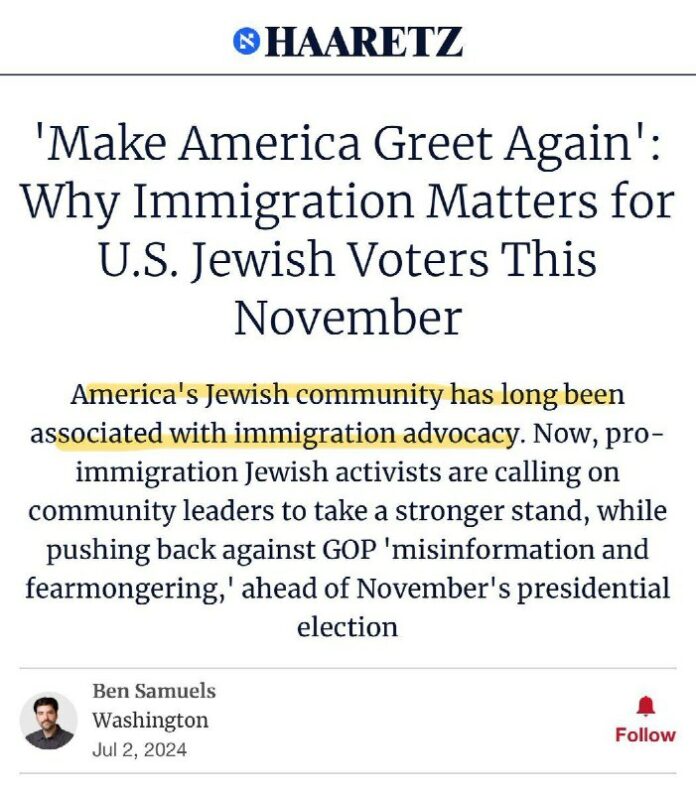
🇺🇸 🇮🇱 ‘Make America Greet Again’: Why Immigration Matters for U.S. Jewish Voters This November | Haaretz
🔶️ HIAS President and CEO Mark Hetfield: “After 250 years of history, this is one lesson we should have learned by now. The way to make America great again is to make America greet again.”
🔶️ HIAS, founded in 1881, is a global Jewish nonprofit committed to protecting refugees, asylum seekers and other forcibly displaced and stateless persons. Members of the organization particularly opposed the use last Thursday of anti-immigrant rhetoric and conspiracy theories about a border “invasion.” This, they lamented, was reminiscent of the discrimination faced by generations of immigrants in some of America’s darkest moments.
🔶️ According to a June 2023 Jewish Electorate Institute national survey (the most recent, thorough survey that wasn’t exclusively focused on the aftermath of October 7), 13 percent of Jewish voters deemed immigration one of the two most important issues when deciding how they will vote in November. This made it the sixth-most important overall (“The future of democracy” topped the list), more than double the 6 percent of voters who tapped Israel.
🔶️ Perhaps most worrying, though, was the face the assailant behind Pittsburgh’s Tree of Life synagogue massacre – the deadliest antisemitic attack in U.S. history – specifically condemning HIAS while promoting the antisemitic “great replacement theory” (a far-right belief that there’s a plot to undermine the political power and culture of white Westerners).
🔶️ Immigration is in the DNA of the American-Jewish story. Three million Jews immigrated to the United States between 1880 and 1920, while many thousands were turned away in the 1930s and ’40s – and U.S. Jews have been particular advocates on immigration over the past 100 years.
🔶️ However, for Ruth Messinger, a leading Jewish-American advocate and former senior New York politician, today’s Jewish establishment is failing in its duty to frame immigration as a quintessentially Jewish issue.
🔶️ “Yes, we’re concerned right now with a war in the Middle East. Yes, we’re concerned right now with rising antisemitism. So perhaps national immigration policy can’t be our front-and-center issue,” she added. “But we know these stories. We’ve actually known them for thousands of years. We are a wandering people often looking for a home.”
📎 Haaretz
In the lead-up to the November elections, immigration has emerged as a critical issue for Jewish voters in the United States. The recent rise in anti-immigrant rhetoric and conspiracy theories has prompted many in the Jewish community to reflect on the importance of welcoming immigrants and refugees.
One organization at the forefront of this movement is HIAS, a global Jewish nonprofit dedicated to protecting refugees, asylum seekers, and other forcibly displaced individuals. HIAS has been vocal in its opposition to the demonization of immigrants, highlighting the historical parallels with past discrimination faced by generations of immigrants in the country.
A recent survey by the Jewish Electorate Institute found that 13 percent of Jewish voters consider immigration to be one of the two most important issues in determining their vote. This places immigration as the sixth-most important issue overall, surpassing even concerns about Israel.
The tragic events at Pittsburgh’s Tree of Life synagogue, where the assailant targeted HIAS specifically, have underscored the urgent need for a more compassionate approach to immigration. The shooter’s promotion of the antisemitic “great replacement theory” further emphasizes the connections between anti-immigrant sentiment and hatred towards minority communities.
Immigration holds a special significance in the history of American Jews, with millions of Jewish immigrants seeking refuge in the United States between 1880 and 1920. Despite facing challenges and discrimination, the Jewish community has been instrumental in advocating for inclusive immigration policies over the past century.
However, some critics argue that the current Jewish establishment has failed to prioritize immigration as a core issue. Ruth Messinger, a prominent Jewish-American advocate, believes that the community must do more to frame immigration as a quintessentially Jewish concern, rooted in a shared history of displacement and seeking a safe haven.
As the November elections approach, it is clear that immigration will continue to be a defining issue for Jewish voters. The call to “Make America Greet Again” reflects a broader commitment to welcoming and supporting immigrants, in alignment with Jewish values of compassion and justice.

